

BnF - IFLA 2014 Satellite Meeting - Linked Data in Libraries: Let's make it happen! - Program. Plenary session 1 moderated by Gildas Illien (BnF) They made it happen...
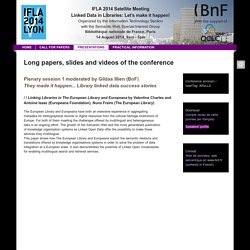
Library linked data success stories Linking Libraries in The European Library and Europeana by Valentine Charles and Antoine Isaac (Europeana Foundation), Nuno Freire (The European Library) The European Library and Europeana have both an extensive experience in aggregating metadata for bibliographical records or digital resources from the cultural heritage institutions of Europe. For both of them meeting the challenges offered by multilingual and heterogeneous data is an ongoing effort. The growth of the Semantic Web and the more generalised publication of knowledge organization systems as Linked Open Data offer the possibility to make these services truly multilingual. 23 min We grew up together: data.bnf.fr from the BnF and Logilab perspectives by Agnès Simon and Sébastien Peyrard (BnF), Vincent Michel and Adrien Di Mascio (Logilab) 28 min 15 min Plenary session 1 Q&A 34 min 20 min Plenary session 2 Q&A.
UILLD : un satellite de l'IFLA. Linked data and libraries S Gradmann. Content-Negotiation for WorldCat. By Richard Wallis on June 3, 2013 - 2 Comments Published in Consuming Data , Development , Libraries , Linked Data , OCLC , schema.org , Web , WorldCat Tagged: Linked Data , RDF , RDFa , WorldCat I am pleased to share with you a small but significant step on the Linked Data journey for WorldCat and the exposure of data from OCLC .
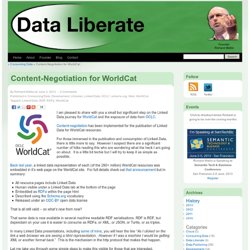
Content-negotiation has been implemented for the publication of Linked Data for WorldCat resources. For those immersed in the publication and consumption of Linked Data, there is little more to say. However I suspect there are a significant number of folks reading this who are wondering what the heck I am going on about. It is a little bit techie but I will try to keep it as simple as possible. Quels enjeux pour les bibliothèques et l’open data? Electrelaboutique. 12 - Semantic Web in Libraries - Programme. Simple Semantic Enrichment of Scientific Papers in Social Sciences Alexander Garcia / Philipp Mayr / Leyla Jael Garcia Florida State University / GESIS - Leibniz Institute for the Social Sciences / Universität der Bundeswehr, E-Business and Web Science Research Group In this paper we present a simple methodology for enriching scholarly papers in the social sciences domain.
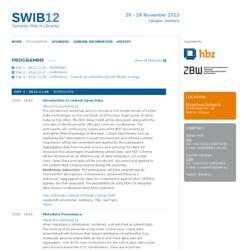
We are making use of existing technology; resulting from our approach we obtain a publication readily available for the Web of Data. Our scenario is that posed by the journal Methods, Data, Analysis (henceforth MDA); an archive of PDF files, rich bibliographic metadata available, a publication workflow mostly based on word files, no navigation tools tailored for this journal, no previous structure in the content of the journal - authors are free to organize the document as they best consider. As there is a pre-existing archive the solution could not simply consider future publications. Pascal Christoph hbz, Germany. Semantic Web in Libraries - Programme. A Future Role for the Library Discovery Interface.
FRBR RDA. Evolutions des catalogues, évolutions des métiers, ce qui va changer dans nos établissements - Association des Bibliothécaires de France - Groupe régional Midi-Pyrénées. Evolution des catalogues 2 : Je catalogue, tu FRBRises, il/elle googlise... - Association des Bibliothécaires de France - Groupe régional Midi-Pyrénées. Quelle place pour le catalogage aujourd'hui ? Parcours Sudoc - Quelle trajectoire pour les catalogues français da... Parcours Sudoc - Sudoc, FRBR, RDA, etc...
Le Sudoc en RDF : la documentation est en ligne. Le saviez-vous ?
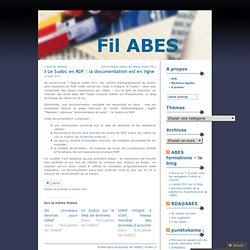
Depuis juillet 2011, les notices bibliographiques du Sudoc sont exposées en RDF. Cette démarche visait à intégrer le Sudoc – ainsi que l’ensemble des bases maintenues par l’Abes – sur le web de données, un chantier qui avait déjà fait l’objet d’autres billets sur Punktokomo, le blog technique de l’Abes (ici et là). Désormais, une documentation complète est disponible en ligne : elle est accessible depuis la page d’accueil du Guide méthodologique, onglet "Manuels", rubrique "Administration et outils" : le Sudoc en RDF. Cette documentation comprend : une introduction succincte sur le web de données et les standards utilisés ;les moyens d’accès aux données du Sudoc en RDF, notice par notice ou via un moteur de recherche externe ;un aperçu, illustré d’exemples concrets, de requêtes permettant de les exploiter ;le modèle de données : les espaces de noms, les vocabulaires utilisés et le tableau de correspondance Unimarc-RDF.
Patrimoine écrit du Moyen-Age et de la Renaissance. Bristish Library datamodelbook. Semantic Web. Updating the Library of Congress with Semantic Technology. According to a recent article, “The Library of Congress has announced that it is going to undertake a major reevaluation of bibliographic control in a move that could lead to a gradual transition away from the 40-year-old MARC 21 standard in which billions of metadata records are presently encoded.
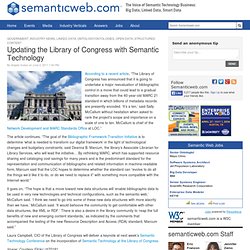
‘It’s a ten,’ said Sally McCallum without hesitation when asked to rank the project’s scope and importance on a scale of one to ten. McCallum is chief of the Network Development and MARC Standards Office at LOC.” The article continues, “The goal of the Bibliographic Framework Transition Initiative is to determine ‘what is needed to transform our digital framework’ in the light of technological changes and budgetary constraints, said Deanna B. It goes on, “The hope is that a move toward new data structures will ‘enable bibliographic data to be used in very new technologies and technical configurations, such as the semantic web,’ McCallum said. Semantic Search the US Library of Congress. As the national library of the United States, the Library of Congress has created vast amounts of metadata to describe books and other documents in its collection.
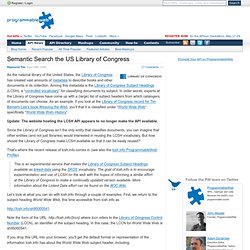
Among this metadata is the Library of Congress Subject Headings (LCSH), a “controlled vocabulary” for classifying documents by subject. In order words, experts at the Library of Congress have come up with a (large) list of subject headers from which catalogers of documents can choose. As an example, if you look at the Library of Congress record for Tim Berners-Lee’s book Weaving the Web, you’ll that it is classified under “World Wide Web“, specifically “World Wide Web–History“. Update: The website hosting the LCSH API appears to no longer make the API available. Since the Library of Congress isn’t the only entity that classifies documents, you can imagine that other entities (and not just libraries) would interested in reusing the LCSH vocabulary.
BNF. Home - Trove. Library Linked Data. Dewey Decimal Classification / Linked Data. UDC Summary Linked Data. BnF - IFLA 2014 Satellite Meeting - Linked Data in Libraries: Let's make it happen! - Program. RDF Linked data cataloguing at Oslo Public Library. This post was originally published as an article in SCATnews no. 41, the Newsletter of the Standing Committee of the IFLA Cataloguing Section.
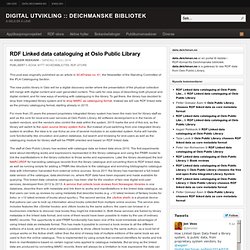
The new public library in Oslo will be a digital discovery center where the presentation of the physical collection will merge with digital content and user generated content. This calls for new ways of describing both physical and digital content, and for new ways of working with cataloguing in the library. To get there, the library has decided to drop their integrated library system and to drop MARC as cataloguing format. Instead we will use RDF linked data as the primary cataloguing format, starting already in 2015.
Web Sémantique & Bibliothèque.